Engineering A Smooth Ride
Mr Jonathan Teoh experiences the deepest job satisfaction when passengers are so comfortable that they barely notice the bus they’re on.
According to the senior manager of bus logistics and maintenance at SMRT Buses, that’s the ultimate testament to a job well done by the bus engineers and technicians. Said Mr Teoh: “A tremendous amount of work goes into every bus, from planning, scheduling and maintenance to conducting improvement projects and regular inspections. All of this is done to ensure a safe and reliable experience for commuters.”
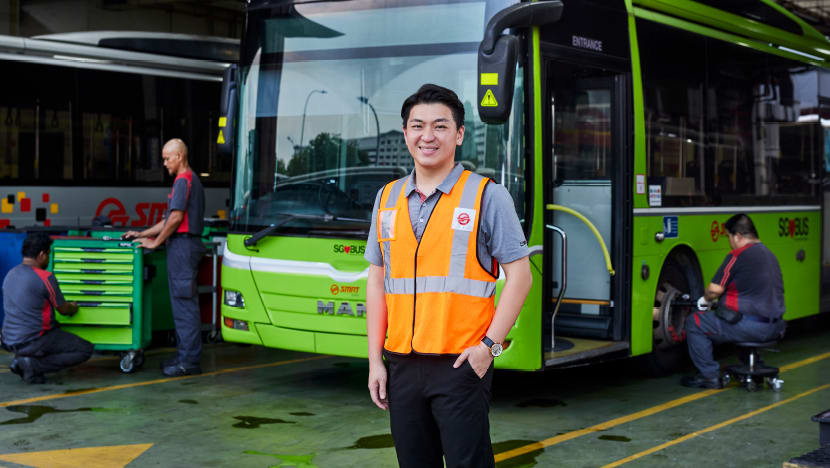
Mr Jonathan Teoh, senior manager of bus logistics and maintenance at SMRT Buses, says that a rewarding internship experience while he was an undergraduate helped kindle his passion for the public transport industry.
BUILDING A TECHNICAL FOUNDATION
Mr Teoh’s journey into the world of bus engineering began during his time at Nanyang Technological University, where he took up an internship with SMRT and learnt the intricacies of commercial fleet maintenance contracts.
“The rewarding internship experience kindled my passion for this industry,” he recalled. “I joined SMRT Automotive Services right after graduating in 2012 with a Bachelor of Science in Electrical and Electronic Engineering.”
Mr Teoh started his career in 2012 in the engineering department, which handles the purchase of buses and taxis. The department was also responsible for various projects and system implementations that gave him a technical foundation of vehicular technologies.
In 2016, Mr Teoh was transferred to the bus maintenance department of SMRT Buses. He then moved on to bus logistics and maintenance at SMRT Buses and has been with the team since 2020. While his initiation into the world of bus engineering was challenging, Mr Teoh’s willingness to ask questions, roll up his sleeves and engage in continuous self learning gave him invaluable on-the-job knowledge.

Mr Teoh’s day starts with a toolbox briefing with engineers, supervisors and technicians.
“I had to familiarise myself with the technical aspects of various bus makes and models. Each has a unique set of subsystems, such as the engine, transmission, doors and air-conditioning,” he recounted.
“I spent a lot of time with my technicians and reached out to original-equipment manufacturers to clarify my doubts. The experience broadened and deepened my technical capabilities and knowledge, allowing me now to better guide my team. My learning journey progresses as new bus models are continually added to the SMRT bus fleet.”
A DAY IN THE LIFE OF A BUS ENGINEER
8am: Mr Teoh starts his day with a toolbox briefing with engineers, supervisors and technicians. “This is where we have our daily SMRT Safety Moment – a session to reinforce the importance of safety in every task – and share workshop key performance indicators. We also check on the buses scheduled for the afternoon, technical bulletins and other operational matters,” he said.
10am: He holds meetings with stakeholders spanning bus operations, maintenance and inventory engineering, manufacturers and original-equipment manufacturers.
2pm: Mr Teoh conducts walks on the ground to communicate with technicians. “Daily communication with my staff is essential. It fosters a safe environment where they feel comfortable seeking assistance if required.”
4pm-6pm: The day usually ends after ensuring that there are enough buses for the evening peak hour, concluding with a housekeeping routine in the workshop.
OPPORTUNITIES TO ENGINEER CAREER GROWTH
Beyond technical knowledge, Mr Teoh believes that excellent communication skills are vital, especially when dealing with novel or complex situations where solutions are not readily available.
“Effective communication makes a big difference in how tasks and projects are executed,” he explained. “I enjoy gathering diverse insights to come up with an effective technical solution.”
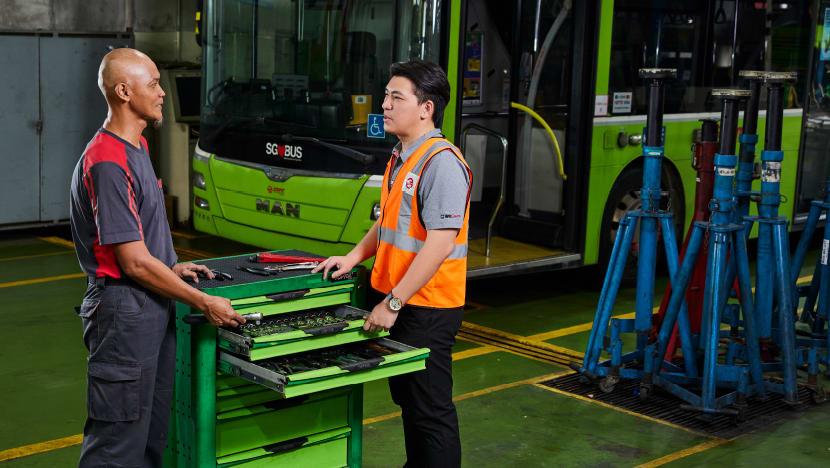
“SMRT BUSES OFFERS A DYNAMIC LEARNING LANDSCAPE WHERE I HAVE THE CHANCE TO LEAD KEY PROJECTS, GO ON OVERSEAS LEARNING AND NETWORKING TRIPS, AND STAY ABREAST OF THE LATEST ADVANCEMENTS IN BUS TECHNOLOGY. THIS, IN TURN, HELPS FINE-TUNE OUR MAINTENANCE PROCESSES AND PROMOTES KNOWLEDGE-SHARING WITH OTHER OPERATORS.”
– MR JONATHAN TEOH, SENIOR MANAGER OF BUS LOGISTICS AND MAINTENANCE, SMRT BUSES
Mr Teoh was also involved in the procurement of buses. “I was part of the engineering team in charge of technical specifications, tender evaluation and bus selection,” he shared. “This allowed me to experience the end-to-end process, from project conceptualisation to bus delivery. Having the chance to delve into intricate details like the chassis, body and sub-systems was eye-opening. It was almost like building a bus from scratch, which drove home the precision needed to provide a smooth and reliable journey for commuters.”


BUS CARE FOR A COMFORTABLE RIDE
Mr Tay Thian Jun, a technical specialist at Go-Ahead Singapore (GAS), is another dedicated professional in the industry.
Since 2018, he has been going the extra mile for passengers who will never know he worked on the buses taking them places. “While my job is in bus maintenance, I ensure that the buses are in tip-top shape before deployment,” he said. “As bus technicians, we are dedicated to making sure that the buses are safe and clean for the public.”
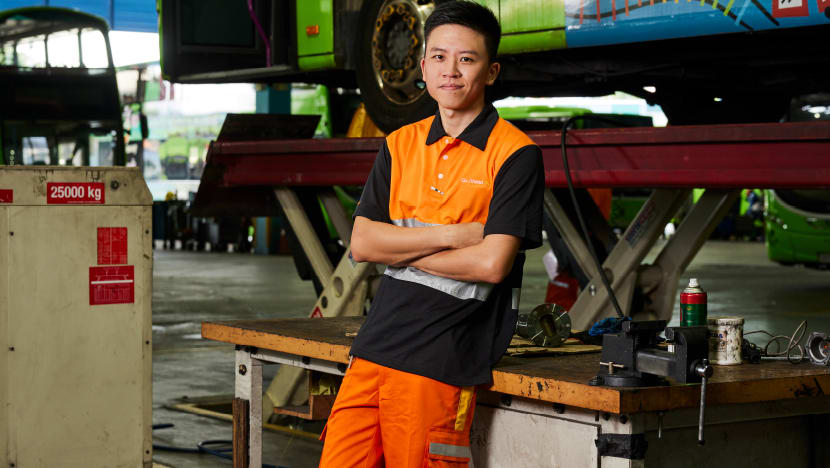
Mr Tay Thian Jun, technical specialist at Go-Ahead Singapore, has acquired a robust foundation in diagnostics and electrical knowledge, which is an important skillset as half of Singapore’s public bus fleet will be electric by 2030.
Mr Tay’s passion for large vehicles like buses has been a driving force in his career. He is particularly intrigued by electric buses and how they operate without an engine and fuel tank. Buses equipped with solar panels are another source of fascination. “The slim solar panels fitted on bus roofs can barely be seen, yet they are effective in reducing fuel consumption,” he said.
Q&A: WHAT DOES A BUS TECHNICIAN DO?
“My supervisor on the maintenance team will first identify buses that need to be fixed. My team and I will then use a diagnostics tool to identify their faults before rectifying them. We work on several buses daily, all while ensuring that the workshop is clean and safe as we go about our duties.
Our goal is to turn around the buses quickly to support daily deployment. We feel a great sense of job satisfaction when we finish repairing all the buses on time.”
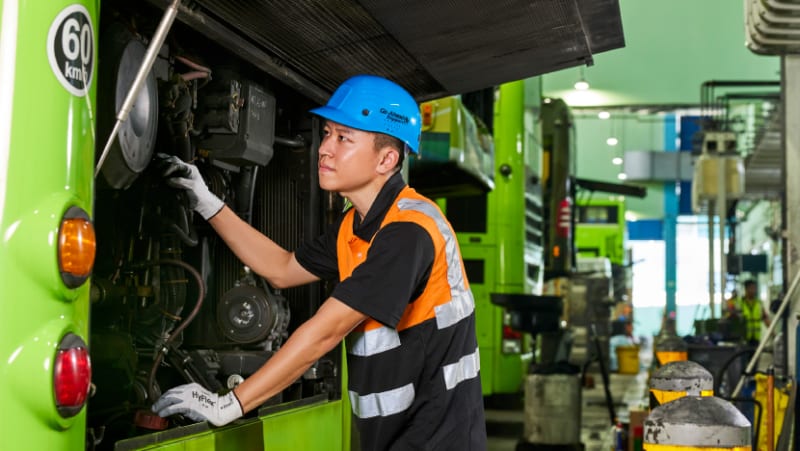
Mr Tay at work doing a bus inspection.
THE FUTURE IS ELECTRIC
As a technical specialist, Mr Tay has acquired a robust foundation in diagnostics and electrical knowledge. It is an important skillset, given that by 2030, half of Singapore’s public bus fleet will be electric.
“Having in-depth knowledge and expertise in these areas will not only enable me to solve more complex problems, but also help advance my career,” he said. “I strongly believe in continuous learning for professional advancement.”
He added that he was excited by the prospect of working on electric buses. “Electric buses require a different skillset and I look forward to acquiring new expertise. These buses are not only more environmentally friendly but also offer quieter and cleaner rides for commuters.”
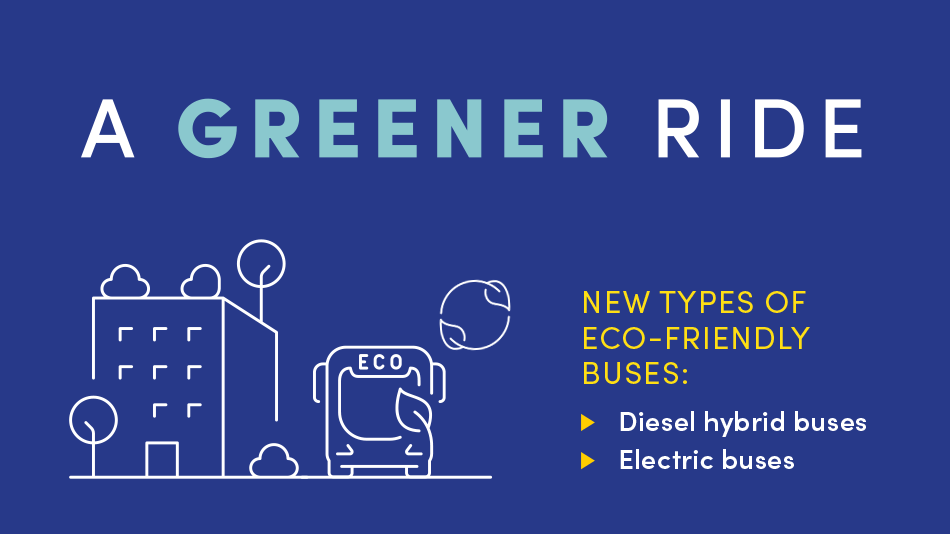
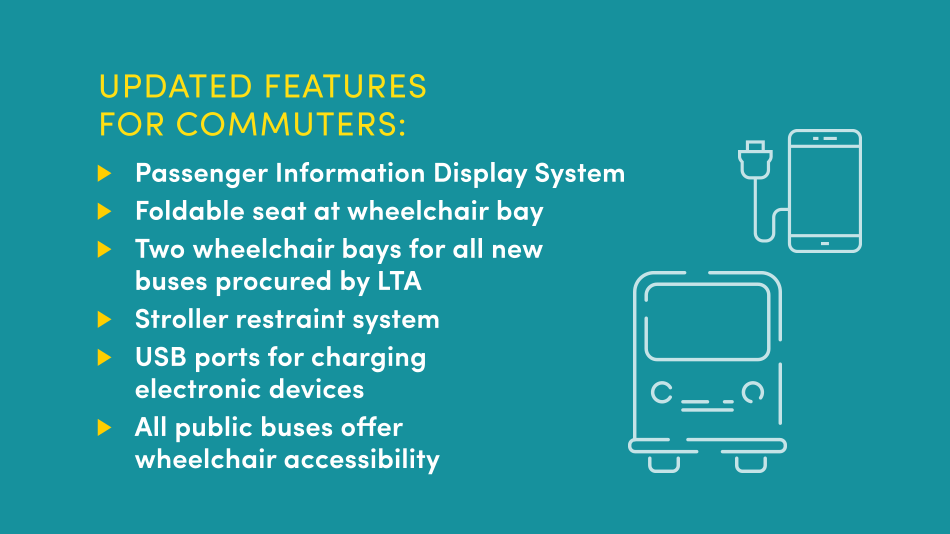
A REWARDING CAREER, A SUPPORTIVE COMMUNITY
Teamwork is an important part of Mr Tay’s job and the rapport he’s built with his co-workers has made his workplace feel like a second home.
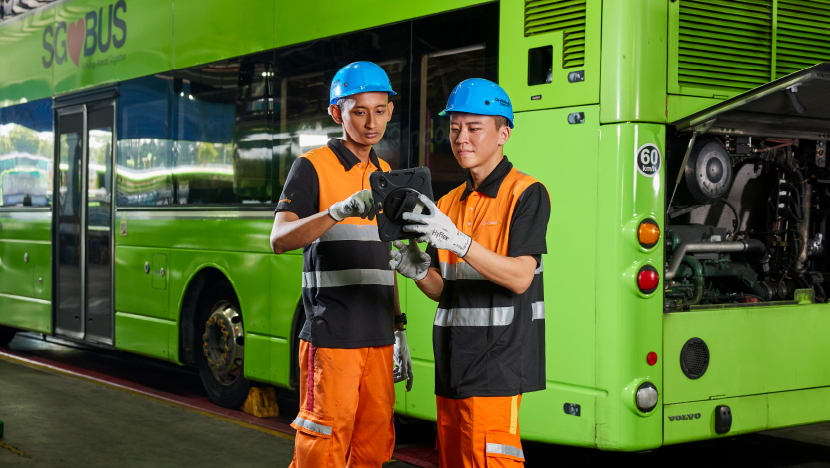
“THE CAMARADERIE AMONG COLLEAGUES MAKES WORK ENJOYABLE. WE TAKE IT UPON OURSELVES TO GUIDE AND MENTOR NEWCOMERS, JUST AS MY SUPERVISOR AND TEAM LEADER ONCE DID FOR ME WHEN I FIRST JOINED THE COMPANY.”
– MR TAY THIAN JUN, TECHNICAL SPECIALIST, GO-AHEAD SINGAPORE
As he looks to the future, Mr Tay aspires to rise to the position of senior technical specialist and eventually, engineering supervisor.
The career path for bus technicians typically includes progression to senior technical specialists and master technical specialists. From there, they can climb the ranks to become an engineering team lead or a workshop manager. Beyond workshop operations, their expertise may also be tapped for interchange and depot operations, technical training or supply management.
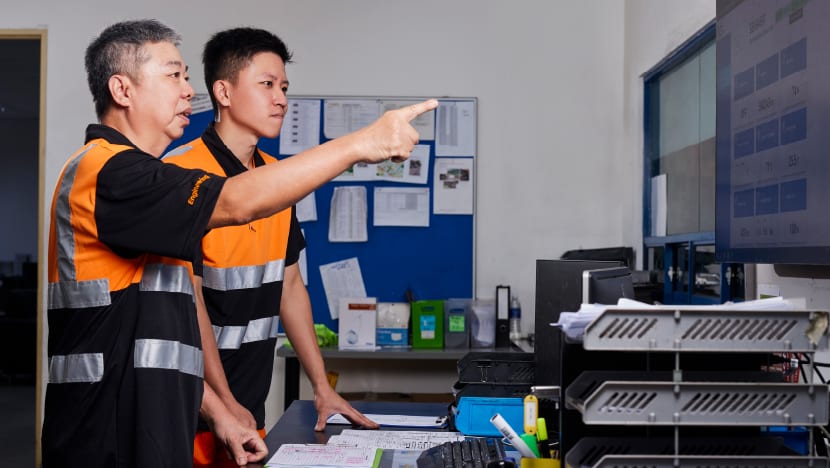
Mr Tay (right) hopes to rise to the position of senior technical specialist and eventually, engineering supervisor.
Mr Tay advises new bus technicians to stay hungry for knowledge on the job, as this will set them on the road to long-term success: “A career in the bus maintenance industry is rewarding. As long as you work hard, you’ll enjoy all that the industry has to offer.”

